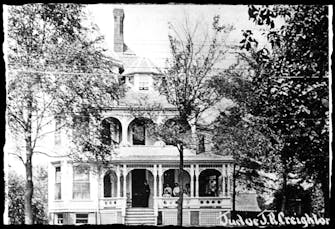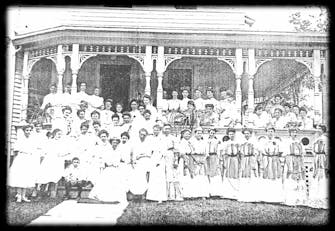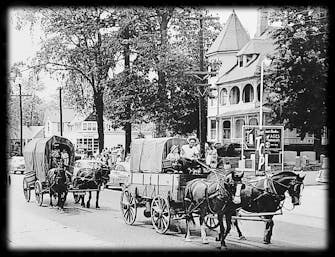Judge Jacob R. Creighton, an Illinois State's Attorney and judge, originally built and owned the house. Respected architect W.E. Felix was hired to design the residence and the Creighton family moved in when construction finished in 1895. Our family, the Taylors, the Boyetts and the Shoemakers, moved here in 2005 and we have slowly been restoring the house to its original grandeur.
Jacob Reed Creighton was one of nine children born to John McClure and Mary Ann Creighton. He was born in White county, Illinois, August 24th, 1848. His wife, Lucretia Elizabeth Bonham, was born on April 6th, 1865 in Fairfield. She was the daughter of Edward and Berintha Bonham. Jacob and Lucretia married on November 29th, 1888. They had three children during their marriage - two sons, Edward W. and John M., and one daughter, Mary.
While researching the house, we found several newspaper articles that provide a glimpse into the lives of the Victorian era residents of Fairfield. We hope you enjoy them as much as we do and we hope you visit us at The Victorian on Main.
Building the House:
- January 24, 1895 - Wayne County Press archives: “J.R. Creighton will build a handsome residence next spring and summer on lots that are desirably located in Bonham’s addition, and we hear it rumored that Judge Kramer will also build on lots in the Bonham addition.”
- February 28, 1895 - Wayne County Press archives: “Hon. J.R. Creighton & family are moving into the property of Mrs. Alex Crews on Jackson St. where they will remain until next fall, at which time they expect to move into a handsome new house, the plans for which are now being drawn by Architect Felix. The house will be erected on the lots just east of the residence of D.F. Fankell, in Bonham’s addition.
- April 25, 1895 - Wayne County Press archives: “Hon. J.R. Creighton has contracted with W.E. Felix for the erection of a fine residence in Bonham’s addition, and on Monday morning Mr. Felix commenced making excavations for the basement. The residence is to be one of the largest and handsomest in our city. It is to have a reception room, parlor, dining room, bedroom, kitchen, bathroom, pantries, etc., on the first floor, and several sleeping apartments on the second floor. In the basement will be the furnace room, laundry, cellar, etc.”
- September 5, 1895 - Wayne County Press archives: “Hon. J.R. Creighton is this week storing his household goods in completed rooms in his new residence, and he and his family will board with Mr. & Mrs. D.F. Fankell until their home is ready for occupancy.”
- April 9, 1896 - Wayne County Press archives: “Hon. J.R. Creighton has had considerable work done on his yard this spring, and it has lately received the finishing touches together with a coat of lime and lawn seed have been sown. He has also had number of extra large shade trees set out on his premises, which, if they all grow will give it quite a forest-like appearance. Mr. Creighton has a handsome home, and he is sparing no expense in an endeavor to make the surroundings attractive.”
Judge Jacob R. Creighton Profile
(source: Wayne County Press obituary - Thursday Apr. 22, 1920)
Judge Creighton was admitted to the bar in 1875, and from that time until the day of his death, he was in public life. Five years after his admission to practice he was elected as State's Attorney of this county, and he was again elected in 1884 and served until 1888, always with credit to his constituents and to himself. In 1888 he was nominated by the Democratic party for the office of Attorney General of Illinois, and showed the confidence the people had in him by running many votes ahead of the remainder of the state ticket.
From 1888 until 1903 Judge Creighton was in the general practice of the law, not only in his home county, but throughout the southern part of the state. During this time the firm of which he was a member, Creighton and Kramer, were the attorneys for Illinois for the Southern Railway Company and the B. & O. S. W. Ry. Co. with offices in both this city and at East St. Louis.
In June 1903 he was elected Judge of the Circuit Court for the Second District, and was reelected in June 1909, serving until 1915. In his service on the bench he gained the reputation, throughout Illinois, of a fair and just and Judge and in 1912 he was selected by the Supreme Court as one of the Justices of the Appellate Court in the Springfield District, for the term ending June 1915.
As is well known, the work in that district requires a high grade of judicial training due to the fact that the constitutionality of many of the acts of the General Assembly are tested there, that being the seat of the state government. After serving for about a year and a half he asked the Supreme Court to relieve him from service in the Appellate Court because the work in the Circuit Court was getting behind and needed his services.
When he retired from the Appellate Court, not a single case brought to him was left undetermined. In 1914 Judge Creighton was appointed as Assistant Attorney General under Hon. P.J. Lucey and served for that year. He was assigned to the important work of advising and looking into the legal work of the Insurance Department and the office of the Auditor of Public Accounts. He was actively interested in the affairs of his party, and was recognized as one of its careful and able advisors not only locally but in the state and nation.
In 1916 he was appointed as a member of the finance committee of the National Committee of the Democratic party and rendered valuable aid to the committee and the party. In 1912 he was a delegate from this district to the National convention of his party at Baltimore, and cast his ballot for the nomination of Mr. Wilson.
In 1916 Judge Creighton was named as one of the eight delegates at large from Illinois to the Democratic National Convention at St. Louis, his associates being Gov. Edward F. Dunne, Roger C. Sullivan, Carter H. Harrison, Robert M. Sweitzer, Robert E. Burke, Jackson M. Pierce and Henry T. Rainey.
On the 25th day of June 1917 he was appointed as a member of the local exemption board of this county, and served until the 20th of September, 1918, as chairman of the board. In this difficult position he never avoided a duty, no matter how unpleasant or evaded any responsibility in the least. As he did in all his other public duties he gave his best in this work and it was only after repeated urgings from his friends that he resigned from the position. To those who watched the course of events it is well known that the intense interest and untiring efforts given to the work of the local board had much to do with the break down of the great strength with which nature had endowed him. Taken from any point of view Judge Creighton always measured up to the highest standard and in every walk of life played the part of a man.
When he retired from the bench, one who knew him said: "He was noted throughout the circuit for having the courage necessary to do what he believed to be right, under all circumstances. During the twelve years he served as Judge of the Circuit Court he won an enviable reputation for being a big, broadminded man, and was universally recognized as one of the great impartial judges of the state.
Lucretia Elizabeth Bonham Profile
(source: Wayne County Press obituary - Thursday, June 10, 1943)
Lucretia Elizabeth Bonham was born on April 6th, 1865 in Fairfield, the daughter of Edward and Berintha Bonham. Her birthplace was the Bonham homestead which stood on the site now occupied by the Haefele-Dixon funeral home, where her funeral will be held.
As a young woman she contributed much to the social and literary life of Fairfield, and was the first woman of the county to receive a college degree. In 1886 she was graduated from the Cincinnati Wesleyan College with the degree of Bachelor of Arts. While in college she was instrumental in organizing I. C. Sorosis, which later became the National Pi Beta Phi Sorority.
In childhood she became a member of the Methodist church, and during the years of her membership, she had served as president of every women's organization within the church. Her guidance as a Sunday School teacher endeared her to many of the residents of this community.
In 1888 she was married to Jacob R. Creighton, at that time candidate for Attorney General of Illinois. Later Judge Creighton served as Judge of the Circuit and Appellate Courts, and was recognized as one of the state's most prominent jurists. To this union were born three children, Edward W. and Mary, wife of Paul D. Elgin, both of Los Angeles, and John M., who passed away October 7, 1941. Judge Creighton's death occurred April 14, 1920.
Since the death of her husband, Mrs. Creighton has made her home in Los Angeles, where she was active in church and club circles. For many years she made her home at the New Rosslyn Hotel, there.
Active in Women's Work Here During her many years of residency in Wayne county, she was instrumental in organizing the Fairfield Women's Club, the City Library, the Bible Society and many other organizations. As a member of the Daughters of the American Revolution, she tried to establish a chapter in Fairfield at one time, but there were not enough eligible candidates.
By her friends she is remembered as a gracious hostess, possessed of great charm, and many of the older members of this community will recall the hospitality of the Creighton home.
Her daughter, Mary, and husband, Paul D. Elgin, and the son Edward Creighton and wife, all of Los Angeles, will accompany the body here.
Mrs. Creighton was a member of The National Society of the Daughters of the American Revolution Volume 107 page 85 Mrs. Lucretia E. Bonham Creighton. DAR ID Number: 106281 Born in Fairfield, Ill. Wife of J. R. Creighton. Descendant of Stephen Sanford, as follows: 1. Edward Bonham (1826-93) m. 1860 Berintha E. Woodin (1842-90); 2. Roswell Woodin (1805-68) m. 1829 Lucretia Beecher (1810-73); 3. Zina Beecher (b. 1784) m. 1809 Lucretia Sanford (1789-1880); 4. Stephen Sanford m. Sybil White (d. 1800).
Stephen Sanford (1740-90) served, 1781, in Capt. William Moulton's company under Gen. David Whitney. He was born in Milford; died in Hamden, Conn. Also No. 84925.
Acknowledgements:
We would like to thank the Wayne County Historical Society, Judith Puckett, and The Wayne County Press for helping is compile the history of this beautiful home and the family that built it.
Links:
- Jacob R. Creighton: https://wayne.illinoisgenweb.org/family/bios/1884/wcbff17.htm
- James A. Creighton (Jacob's brother): https://wayne.illinoisgenweb.org/family/bios/1884/wcbff16.htm
- James A. Creighton (photo): https://www.findagrave.com/memorial/30431255/james-a_-creighton
- Edward Bonham (Lucretia's father): https://wayne.illinoisgenweb.org/family/bios/1884/wcbff12.htm
- Rosslyn Hotel Los Angeles: https://www.laconservancy.org/locations/rosslyn-hotel
- Fairfield: https://wayne.illinoisgenweb.org/history/books/old-timers/fairfield.htm
- Wayne County: https://wayne.illinoisgenweb.org/index.htm
- Wayne County Historical Society: http://wayneillinoishistory.com/Home_Page.php





